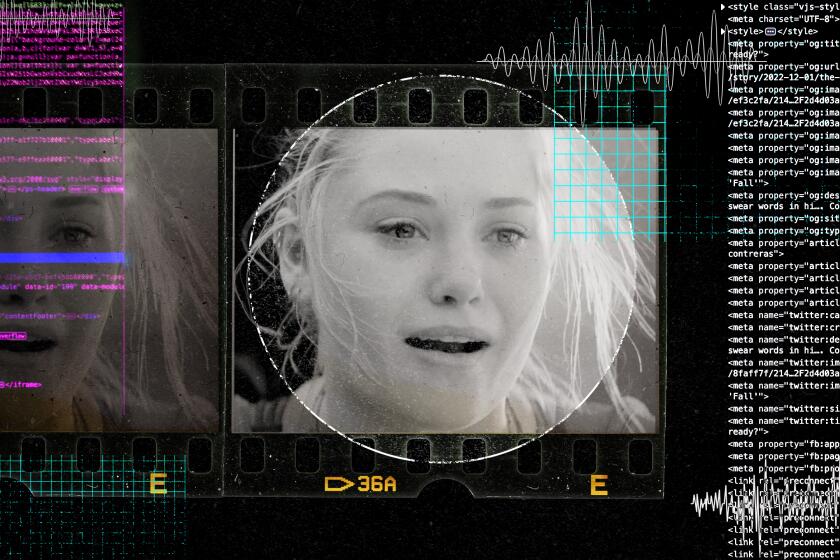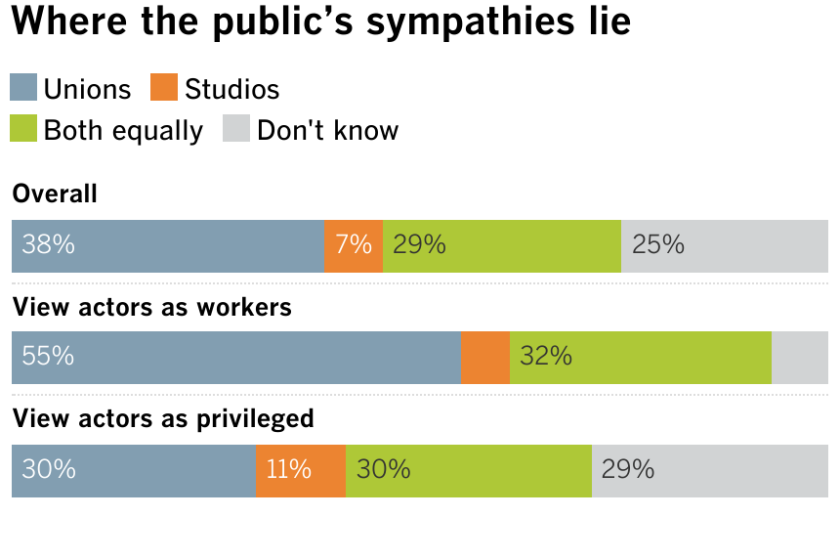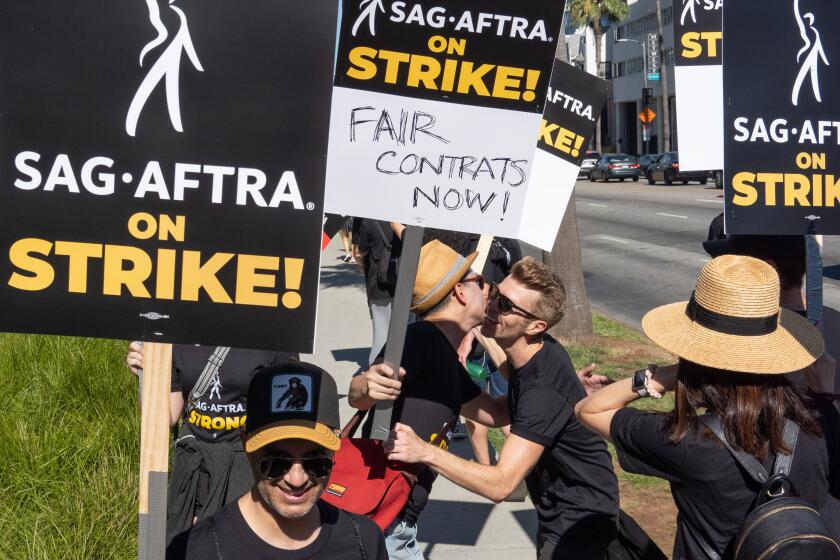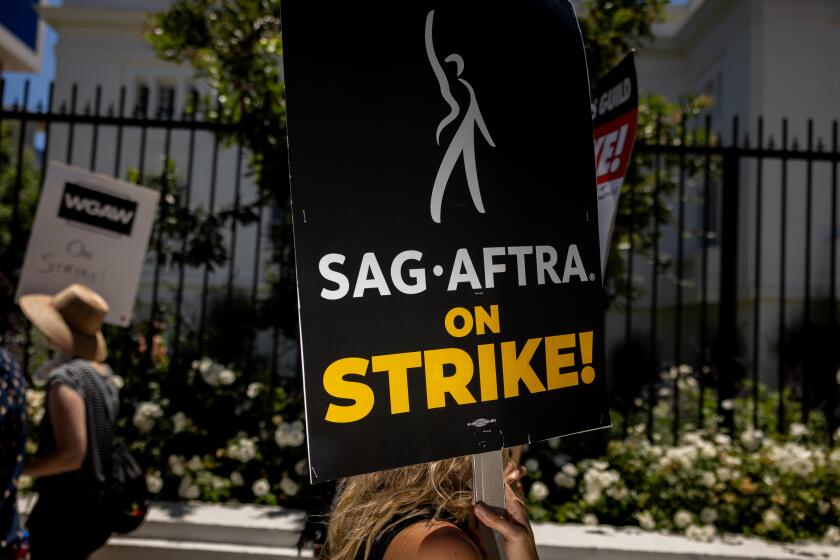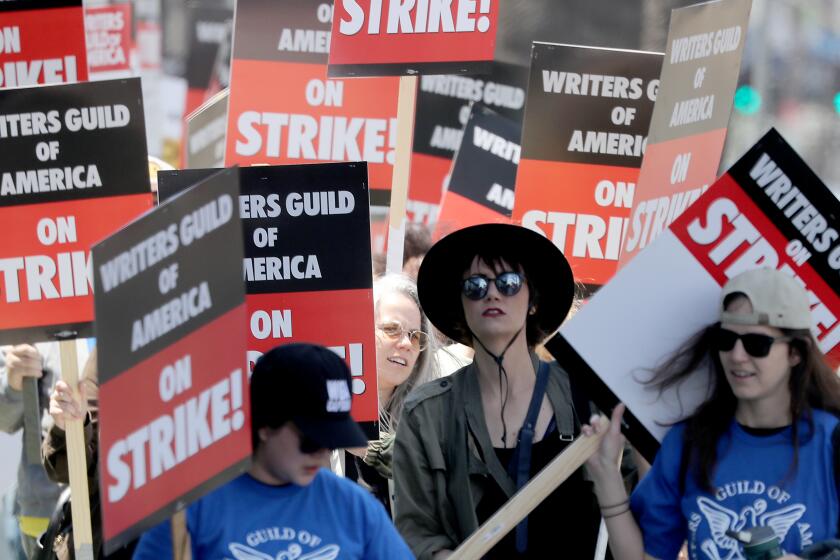Actors and writers aren’t the only ones worried about AI, new polling shows
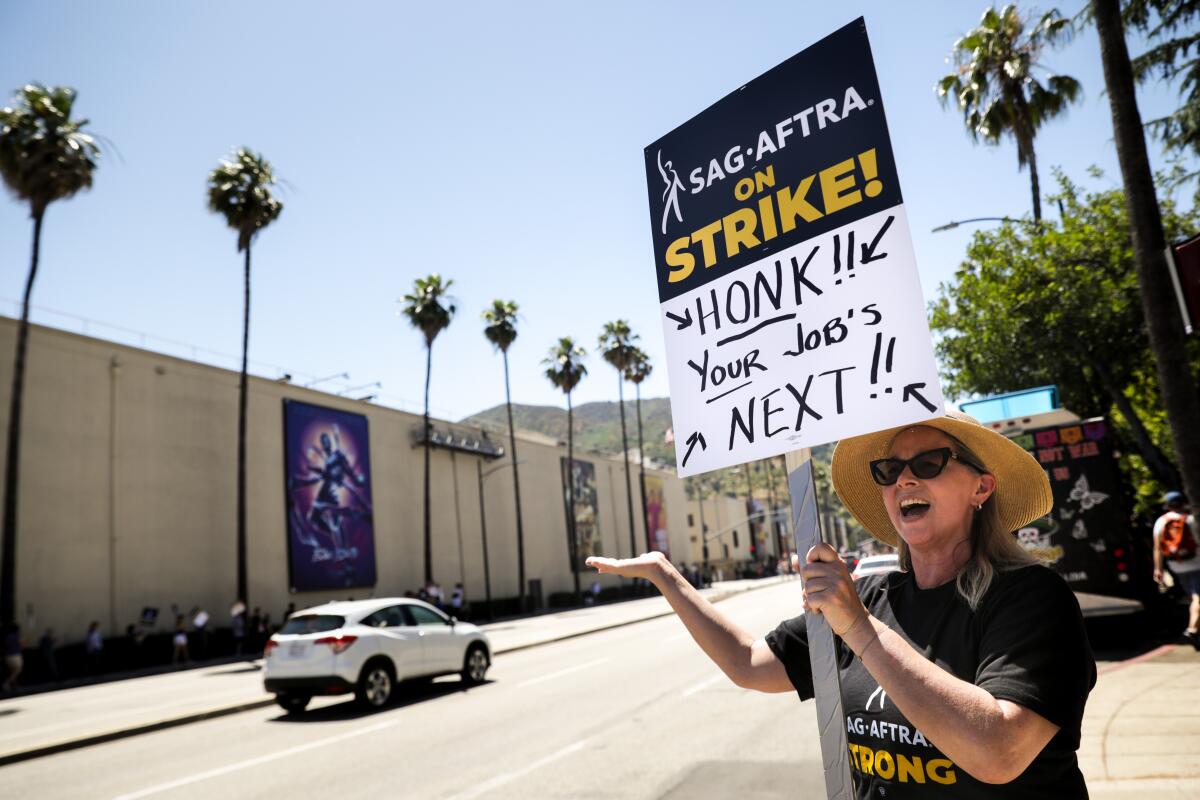
- Share via
With Hollywood’s actors and writers currently striking in part over concerns about AI, what was once a movie premise now has come to define the film industry.
But automation isn’t just a showbiz concern, new polling for the Los Angeles Times shows.
Nearly half of Americans — 45% of them — are concerned about the effect artificial intelligence will have on their own line of work, compared to 29% who are not concerned, according to a new poll for The Times conducted by Leger, a Canadian-based polling firm with experience in U.S. surveys.
Director Scott Mann had an issue: too many swear words in his thriller movie. Could artificial intelligence help him get a PG-13 rating?
The level of concern is consistent across partisan lines and rises to 57% among 18- to 34-year-olds. Americans older than 55 were less likely to express concern about AI affecting their work.
Almost two-thirds of American adults said they thought entertainment unions were justified in making AI a centerpiece of their negotiating demands.
“This is [not just] a Hollywood phenomenon,” said Greg Cross, chief executive of the AI avatar startup Soul Machines. “AI is literally eating the world.”
As previously reported, the same polling showed more public sympathy for union members than the studios, streamers and networks.
A new L.A. Times poll on Hollywood’s double strike finds the public is more likely to support striking actors and writers than studios and streaming services. But many express ambivalence.
The rise of artificial intelligence in the entertainment world is just one of several issues motivating the current strikes, which have found the Writers Guild of America and SAG-AFTRA actors union shutting down productions and picketing outside major studios in pursuit of more job security and fairer pay.
But AI has been a prominent sticking point, with writers demanding limits on machine-generated scripts while actors push for regulations on the use of cutting-edge technologies to digitally “clone” them — enabling studios to create new performances without actually needing an actor on set.
“The use of these AI tools as it relates to performers’ work in projects is a mandatory subject of bargaining under federal labor law,” Duncan Crabtree-Ireland, SAG-AFTRA’s national executive director and chief negotiator, recently told The Times. “The law requires [the studios] to bargain over it with us, and that’s what we’re in the process of doing.”
The Alliance of Motion Picture and Television Producers, which negotiates on behalf of entertainment and media companies, has said in regard to screenwriting that “AI raises hard, important creative and legal questions for everyone” and that AI-generated text isn’t eligible to get a writing credit.
When it comes to acting, the AMPTP has called for what it refers to as informed consent and fair pay in cases where actors get digitally replicated.
Social media influencers — who make their livings as entertainers but aren’t typically part of entertainment unions — now face the complicated labor politics of a Hollywood strike wave.
Hollywood studios and streaming companies have continued to embrace the software revolution, with AI-focused recruitment booming amid the dual strikes. One open role, for a Netflix product management position focused on machine learning technology, suggested a pay range as high as $900,000 a year; other jobs in the field have opened up at Sony, CBS and Disney.
Artificial intelligence has been working its way into the filmmaking process since before the strikes began, with companies popping up in Los Angeles and beyond aiming to disrupt everything from dubbing and stunt work to motion capture and script visualization.
This year’s South by Southwest conference — often a bellwether for trends in tech and media — was awash with entrepreneurs promising to revamp the pop culture landscape with generative artificial intelligence technology.
“[The] entertainment industry is probably the first industry that a mainstream, new, novel technology penetrates,” said Suman Kanuganti, chief executive of the AI messaging platform Personal.ai.
But when it comes to AI, it likely won’t be the last.
Caryn Marjorie, an influencer with 2 million followers on Snapchat, recently made a digital clone of herself. But what happens to social media creators when the robots come for their jobs?
A torrent of money is flowing into the sector — $22.7 billion was invested over the first quarter of this year, according to the market research firm PitchBook — and consumer-friendly AI modules such as ChatGPT and DALL-E have rapidly found a mainstream following.
Industries as varied as law, trucking, retail, policing and journalism are all staring down the barrel of an artificially intelligent future.
It’s perhaps no surprise, then, that Americans are broadly sympathetic to WGA and SAG-AFTRA members’ concerns.
SAG-AFTRA has approved a deal from the studios to end its historic strike. The actors were on strike for more than 100 days.
Job security isn’t the only reason why. Asked whether disclaimers should be included on AI-generated content — more of a consumer-rights question — almost three-quarters of those polled were in favor. That number rose to 80% among Americans 55 and up.
For now, Hollywood’s creative class is focused on shifting the AI status quo through labor actions.
But Americans also are open to another lever of power: Of those polled, 55% said they supported government regulation of AI, while 26% did not.
Support for regulation is stronger among people who voted for President Biden in 2020 than those who voted for former President Trump, but it represents the majority opinion on both sides of the partisan divide.
The 2023 writers’ strike is over after the Writers Guild of America and the Alliance of Motion Picture and Television Producers reached a deal.
Even if these two strikes do change how the entertainment industry uses artificial intelligence, legions of Americans in other professions are anxious about AI — and after Hollywood, they may turn their focus to Capitol Hill.
The Times/Leger poll surveyed 1,002 adult Americans between July 28 and July 30. The results have an estimated margin of error of 3 percentage points in either direction.
More to Read
Inside the business of entertainment
The Wide Shot brings you news, analysis and insights on everything from streaming wars to production — and what it all means for the future.
You may occasionally receive promotional content from the Los Angeles Times.
